Beth Kephart's Blog, page 10
February 8, 2017
Janet Benton and Jill Santopolo: in times of chaos and concern, we need to honor one another's dreams
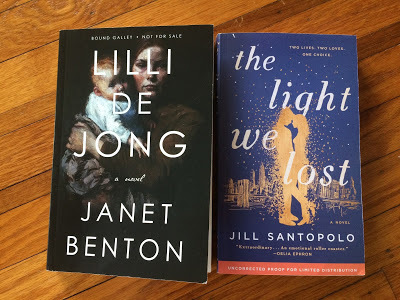 The world is tilting. It is noisy and unsettled, roiling and in need of us, and we respond as we can, when we can, how.
The world is tilting. It is noisy and unsettled, roiling and in need of us, and we respond as we can, when we can, how.In the midst of this now, we can't forget to honor each other. Our individual lives and ambitions matter just as much as they always did. Our dreams are still our dreams.
And so today I am sharing news of two adult debut novels—books that unfurled over the space of many years in the imaginations of two friends.
Janet Benton's Lilli de Jong (on sale in May from Nan A. Talese/Doubleday) is the story of a goodhearted 19th-century Quaker who finds herself pregnant and without choices. Giving birth to her child in a charity for unwed mothers, Lilli refuses to abandon the little girl to an unknown fate, a decision that leaves mother and child in increasingly desperate straits. What doors will open to a smart, decent young woman with an infant in her arms? What compromises will Lilli make to keep the two alive? Where is kindness found?
I had a wonderful time reading Janet's book. It returned me to Philadelphia institutions that have fueled my own imagination and writing—that home for unwed mothers, the Blockley Almshouse, the clanging Baldwin Locomotives neighborhood, the Historic Rittenhousetown, the streets of Germantown, the marketplaces. Janet's research shows on every page, as does her deep understanding of motherhood and choice making, trust and its opposite. Lilli is a character you will root for and despair with, a writer (for Lilli is a writer and we are reading her diary pages) who crafts old Philadelphia like this:
Perhaps from gladness at escaping that harangue and at remembering how everyone is vulnerable to hardship, a tenderness welled up in me toward all the living. I found a stillness within our transitory state, relishing the passing folk intent on business or recreation, and loving the familiar clip-clop of horses, freshly curried and brushed, as they pulled grocery wagons house to house, stopping to deliver milk or ice or bread. The odors of meals escaped through windows, and hunger cut into me.Jill Santopolo's The Light We Lost (on sale in May from G.P. Putnam's Sons) is a book about right now, a story about a woman's undying love for the man who knows and loves her best, but is never quite hers. This is a novel steeped in the melancholy of what might have been, a narrator who writes of her personal history from a suffused and brokenhearted present. This is a story that ponders the porous and saturating nature of love—the lines that can't be crossed, the lines that are, nonetheless, crossed. It is a novel of what if's, and it can't be helpeds. Lucy cannot rewrite the past, and maybe she doesn't want to rewrite or negate the past, even if the past hurts, even if the present cannot free her from her past. Short chapters, look back and ahead at once:
Sometimes we make decisions that seem right at the time, but later, looking back, were clearly a mistake. Some decisions are right even in hindsight. Even though everyone told me not to, and even knowing what happened afterward, I'm still glad I moved in with you that snowy day in January.Why is it that books that break our hearts are books we love to read? Jill's book raises this question again, in all of the best ways.




Published on February 08, 2017 07:10
February 6, 2017
Juncture Workshops and the voices of some of those remarkable writers we've met along the way
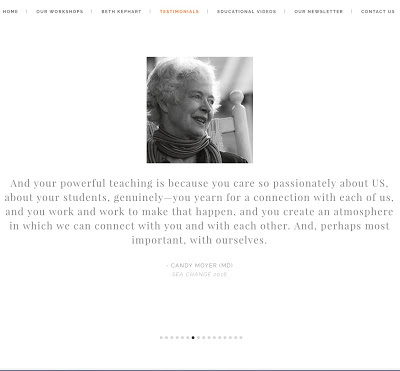 Last year, Bill and I launched Juncture Workshops—on a farm, by the sea. Our dream was to bridge truth to landscape, language to story, and writers to writers. All of that happened, almost miraculously. But what also happened is this: We met people who forever changed our lives.
Last year, Bill and I launched Juncture Workshops—on a farm, by the sea. Our dream was to bridge truth to landscape, language to story, and writers to writers. All of that happened, almost miraculously. But what also happened is this: We met people who forever changed our lives.Authentic souls.
Deep readers.
Outstanding writers.
Storytellers who had us laughing helplessly one minute and tearing up (gigantically) the next.
We're conducting four more workshops in 2017. Our newly updated web site shares the specifics on those workshops as well as images from our first gatherings. The site also unveils the faces and voices of many of those who bravely said yes to our bridge-building scheme.
With gratitude to each of them, we present the writers here, on this link .




Published on February 06, 2017 17:58
February 5, 2017
language as community: a morning spent among writers in the age of alternative facts
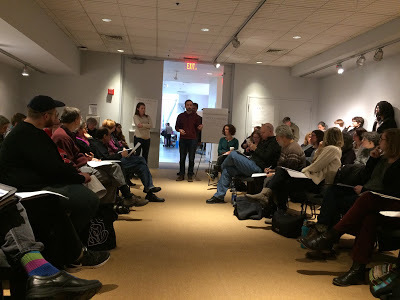 I should have gotten up and gone to the front of the room and taken a real photo. One that honestly mirrored the rows upon rows (Lin-Manuel Miranda style) of those who had come together at the Institute of Contemporary Art during the hours of brunch on a cloudy Sunday to ask: How do we move from resistance to positing a more just society? And: How do we #writeourdemocracy? And: What do we do to capitalize upon the energy we have found, live and palpable, within each other? And: What can writers do that others can't? And: What must writers do that others might not?
I should have gotten up and gone to the front of the room and taken a real photo. One that honestly mirrored the rows upon rows (Lin-Manuel Miranda style) of those who had come together at the Institute of Contemporary Art during the hours of brunch on a cloudy Sunday to ask: How do we move from resistance to positing a more just society? And: How do we #writeourdemocracy? And: What do we do to capitalize upon the energy we have found, live and palpable, within each other? And: What can writers do that others can't? And: What must writers do that others might not?But I didn't stand up. I was rooted in my chair—learning from lifelong advocates, taking a lesson or two in the awful art of gerrymandering, jotting notes on resources like Indivisible, and thinking about my own responsibilities as a woman who has fought, in her books and essays and teaching, on behalf of beauty and transcending purpose.
Writers make room for the dreams of others. Writers harness, to quote Nic Esposito and Linda Gallant from The Head and The Hand Press, the power of entertainment to create meaningful change. Writers are most effective when they tell the truth or when they imagine wholly and when they do not scream. Sometimes writers are at their very best when they offer a respite from the world—a metaphor's remove from the harrowing now, a chance to breathe freely again.
Over the course of two hours that could have stretched to many more, the writers in that room today (led by Nathaniel Popkin and Stephanie Feldman) discussed possibilities—questions, issues, tactics, strategies, resources. I am listing some of the primary elements of that conversation here. We're hoping they inspire you. To find out more about anything listed here, join this email list, and ask questions, make suggestions, say yes to what feels right to you.
Many Philadelphia writers have a felt responsibility to incorporate historic city texts into the conversations that swirl today. As part of that process, work is underway to publish the Philadelphia freedom texts that were read on January 15th during the WritersResistPHL gathering (more that gathering here). Interested in researching and sharing and, indeed, applying additional texts? Ask questions.
Many writers are concerned about purported proposals that would eliminate the National Endowment for the Arts and the National Endowment for the Humanities. Those who would like to participate in drafting a petition or speaking to representatives or framing the importance of the arts to legislators or patrons have an opportunity to get involved.
The Philadelphia-area writers traveling to the AWP conference in Washington, DC, hope to put on a united front—to get to know each other, to advocate with each other, to make a difference together. If you're planning on spending time at the AWP and would like to help organize a united front, check in through the email list.
Philadelphia-area writers and artists and musicians seeking to strengthen the power of their art and the utility of their concerns would benefit from collaboration and conversation with other similar groups across the city and nation. Start or join a conversation about linking your actions/our actions to the work of others via the list.
On April 1, on the Widener campus, an undergraduate-focused Writers Resist program will feature the voices of the young from campuses across our area. If you are a teacher or a parent who knows of undergraduates who would like to read or speak (or if you are an undergraduate!), ask questions.
Every protest march, every protest poster, is ultimately local. Politics happens on a local level, too—through locally elected representatives. Gerrymandering, in the words of the non-partisan organization Fair Districts PA—results in "politicians ... choosing their voters, rather than voters choosing their politicians." One of the most important acts of change will come from those who effectively speak up and out with the tools provided through this organization. There are resources out there. Ask.
If we're going to speak or write or be active, we have to have the facts. Many texts, articles, resources were noted today. If you were one of those sharing links, please share them via the list. If you have additional links to share, please do add those as well.
Many literary journals and bloggers have platforms through which to speak, or platforms from which they might now speak. Among those discussed at today's meeting were Cleaver, which offers a "Life as Activism" segment, the Shockwire Chapbook series developed by The Head & The Hand Press, and mainstream publications. Additionally, there is the Write Our Democracy program, noted above, created by the national WritersResist program—an opportunity for you to write an immigrant's story.
What do writers do? They write. Who can writers help, on a volunteer basis? Those who need some writing done. There are resources out there listing organizations in fields ranging from science and the environment to health care and immigration that could all use a voluntary press corps. If you'd like to help with this, or if you are an organization in need, let your interests be known.
Independent bookstores are sanctuaries, no matter the time of day or the season. But such bookstores have a special role to play today. If you are interested in helping bookstores develop material that might be shared with patrons, get involved.
Many individual writers and artists are hosting speakers, unveiling new exhibits, and launching books at this time—all opportunities to go beyond the typical book launch or lecture or show to bring people together and raise funds for the greater good. If you would like to help manage or create a single listing of such events, please ask questions on the Facebook page. If you would like to help develop a tool kit that might be disseminated at signings and events, please let us know.
Writers will only be effective as a group if the group mirrors our societies as a whole. Today we heard from two women who have embarked on a project designed to help them truly know each other. But what more can be done to ensure that the group that gathered today is sufficiently diverse in all ways? We'd love your ideas.
There was, believe me, more said and proposed and hoped for today. But this, I think, gets us started. I'll conclude this blog posting the way our meeting ended, with words by Calvino, as read to us by Ann de Forest, from Six Memos for the Next Millennium, written in 1985. Excerpting from the excerpt: "Think what it would be to have a work conceived from outside the self, a work that would escape the limited perspective of the individual ego, not only to enter into selves like our own, but to give speech to that which has no language, to the bird perching on the edge of the gutter, to the tree in spring and the tree in fall, to stone, to cement, to plastic......."




Published on February 05, 2017 14:31
February 4, 2017
A VOYA Perfect Ten 2016: THIS IS THE STORY OF YOU (and kind reviews)
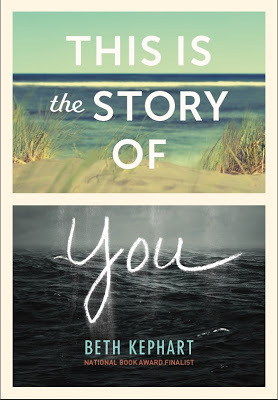 I have become, like so many of you, a close watcher of the news. A woman waking up, panicked, in the middle of the night, wondering what will happen next to our communities, our environment, our economy, our trust in one another, our understanding of true versus false.
I have become, like so many of you, a close watcher of the news. A woman waking up, panicked, in the middle of the night, wondering what will happen next to our communities, our environment, our economy, our trust in one another, our understanding of true versus false.Returning from a birthday meal with my father, I checked in again, on the headlines. I didn't expect to find (within my email) news of the personal sort.
But, goodness, I am grateful for it. Thank you, VOYA, for the Perfect Ten 2016 citation. I quote here from the letter:
... This Is the Story of You—has been awarded the distinction of being a VOYA Perfect Ten 2016. Each year, VOYAMagazine compiles reviews of titles that were awarded a 5Q and a 5P into our annual Perfect Tens list. VOYA’s unique rating system is the only one that weighs both literary quality and teen appeal equally, a distinction that is of great interest and use to those charged with ordering and collecting reading materials for teens.
This list is relied upon by librarians and educators around the country (and the world) in their selection of titles to add to library and classroom collections. It is an invaluable tool to our readership, and a lofty honor to those authors and publishers whose titles are selected.
The full reviews of all of the Perfect Tenhonorees are included in ordering databases/systems of some of the largest book wholesalers and library jobbers in the country, for both public and school libraries. The complete listing of this year’s Perfect Ten reviews will be available to all on our website (www.voyamagazine.com), including the full reviews and book cover graphics. VOYA will be publicizing this year’s list via Facebook and Twitter. We are also publishing these reviews in our sister journal, Teacher Librarian.
As reviews editor, I understand how difficult it is for a title to receive a perfect 10 rating from one of our reviewers. In fact, out of more than 1,100 titles reviewed last year, only 33 titles were awarded this honor. That’s less than 3% of all titles reviewed. Our reviewers are cautioned to consider and re-consider a number of issues before deciding on a 5Q 5P rating assignment for a book. It is not a designation given lightly—nor is it given by novices. Our reviewers are seasoned library and education professionals who work directly with young adult readers and have a broad base of understanding and appreciation for YA literature.
In sum, a VOYAPerfect Ten is a laudable accomplishment that very few titles can claim. Congratulations again, and thank you for allowing VOYA to be part of celebrating your outstanding contribution to YA literature.
I would like to take this moment in time to thank as well Florinda and Sarah for their extremely kind reviews/citations of Story. The 3R's blog had this to say. Sarah Laurence, meanwhile, named Story one of the Best Contemporary YA novels of the year, here.
We live in bracing times. These acts of kindness, toward a story I wrote, are welcome glimmers of light.




Published on February 04, 2017 04:42
January 28, 2017
not losing; not remaining lost (writing back into the world)
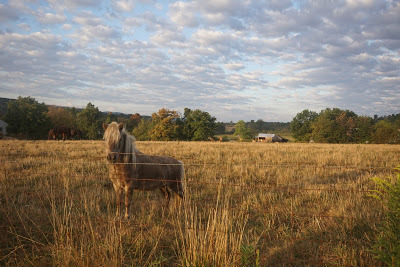 For many of us, these are difficult days. The news is a barrage, and we spin. Fingers in dikes. Calls to friends. Writers Resists. Private little sit downs. On what do we focus? And how?
For many of us, these are difficult days. The news is a barrage, and we spin. Fingers in dikes. Calls to friends. Writers Resists. Private little sit downs. On what do we focus? And how?Last year was a strange time for me in many ways. I'd trusted what had not earned my trust. I'd relinquished momentum, and hope. Between the personal and the political, I felt the world seize up, and it remained seized up for far too long.
One can remain lost, or one can fight to regain one's footing. In swelling uncertainty, I turned at last to books—reading into the stacks that had accumulated around this house (a reading binge that I wrote of here ). I turned, too, to the class I teach at Penn (memoir) and to two semester-long student projects on short fiction; one must prepare, one must read deeply, one must sit and helpfully (peaceably) think. Finally, then, I returned to writing, something I had to remember how to do. It's always like that, with writing and me. I have to remember how it gets done.
I rewrote a novel, word by word, and it is so much better than it was. I reconfigured a long-standing project and began to talk with an editor about its shape. I condensed a book I'd been writing into an essay I sold. I returned to a second, fledgling novel and wrote it through in a mad three AM daze. Wrote that book inspired by someone, for someone, with an abiding sense of purpose.Wrote it, and it made me happy; it was (again) a form of peace.
We can't control so much of our lives, but we can shape, at least in part, how we spend our time, our love, our thoughts. We can hold onto the negative, or we can burst through—shaping stories, giving stories, building communities. We achieve little when we stay inside the darkness. We live when we don't remain lost. Focused within ourselves, we can then focus on the news and decide just what we'll do, who we'll be, how we will manage the barrage.




Published on January 28, 2017 03:36
January 16, 2017
the Us of Us at Writers Resist
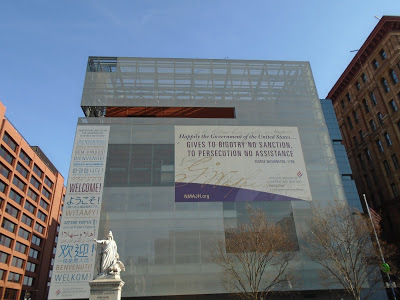 "Friday the Thirteenth," was written in 1970 by Allen Ginsberg. Hillary Clinton made her remarks for the United Nations 4th World Conference on Women in 1995. Jameson Fitzpatrick wrote "I Woke Up" in 2016, and Toni Morrison published Beloved in 1987, and Octavius V. Catto and others prepared the Address of the Colored State Convention to the People of Pennsylvania in 1865, and James Baldwin released The Fire Next Time in 1963, and Che Guevera offered his thoughts in Socialism and Man in Cuba in 1963, and Mia Mingus wrote "Wherever You Are is Where I Want to Be: Crip Solidarity," and then there was Langston Hughes in 1936, with "Let America Be America Again."
"Friday the Thirteenth," was written in 1970 by Allen Ginsberg. Hillary Clinton made her remarks for the United Nations 4th World Conference on Women in 1995. Jameson Fitzpatrick wrote "I Woke Up" in 2016, and Toni Morrison published Beloved in 1987, and Octavius V. Catto and others prepared the Address of the Colored State Convention to the People of Pennsylvania in 1865, and James Baldwin released The Fire Next Time in 1963, and Che Guevera offered his thoughts in Socialism and Man in Cuba in 1963, and Mia Mingus wrote "Wherever You Are is Where I Want to Be: Crip Solidarity," and then there was Langston Hughes in 1936, with "Let America Be America Again."You put your heart down on a page, the long excursion of your worries, your cracked skies of hope, your insistence, your chides, and then you put your name beneath those words, and finally you say: Here. This is for you. Take.
Yesterday at the National Museum of American Jewish History, in my city of often raucous love, as part of the worldwide #Writers Resist initiative, the words crafted by others became the words of Us, and by Us I mean the three dozen writers and producers and musicians and editors who took the stage. I mean the Us who crowded that standing-room-only auditorium, breathless and leaned into and moved. I mean the Us who came wrapped in the arms of parents and those who strolled or wheeled in and those who didn't know what they were getting into and those who had no idea who might come. Would anybody come? We were Us yesterday, and the words we shared belong to Us, and we claimed them, not for our own individual advancement, not to be a lit star, not to curry praise for our inspired performance, our own ingenious orchestrations of words, but because Us is the legacy we share, the legacy we must carry forward if we are to be decent and good and wide thinking and effective and, yes, that word again, inclined toward hope.
Forgive me, writers, but at times, is this not true?: We take the stage, we stand beneath the lights, and we want outcomes for ourselves. We want to be remembered for and as ourselves, taken seriously for and as ourselves, asked, for and as ourselves, to sign the books waiting in the lobby. Our books. With our names right there on the pretty covers. But that wasn't writers yesterday. Yesterday we remembered that our first job, always, is empathy. Our first responsibility is to slide inside the wrappings of others and imagine ourselves to be them, and so we did, and I will never forget the feeling that I had, the feeling that you gave me yesterday, of sitting there and briefly standing there, and transcending.
Thank you, all of you. Thank you, Nathaniel Popkin and Stephanie Feldman and Alicia Askenase, for bringing us together. Thank you, PEN America and Erin Belieu, for bringing the power of the word to the people.
Now we continue on.




Published on January 16, 2017 03:51
January 15, 2017
Dear Mr. Springsteen:
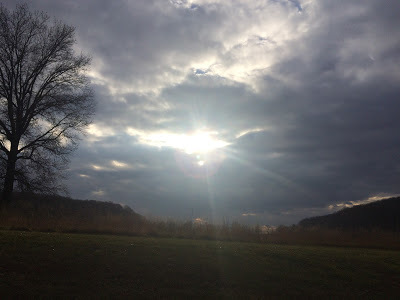 Later today I'll be joining with three dozen other writers and artists and editors and lovers of language in my city, Philadelphia, to read your words on behalf of Writers Resist. I'll invoke the authentic, there's only one of you you, I promise. Thank you for giving us words to hold onto.
Later today I'll be joining with three dozen other writers and artists and editors and lovers of language in my city, Philadelphia, to read your words on behalf of Writers Resist. I'll invoke the authentic, there's only one of you you, I promise. Thank you for giving us words to hold onto.When the way is dark and the night is cold
One sunny mornin' we'll rise I know
And I'll meet you further on up the road.....




Published on January 15, 2017 06:59
January 9, 2017
"Original Philadelphian": an indepth interview with Joe Glantz
 I've spent time talking with Joe Glantz through the years. Reading his funny, history-fueled quips. Remarking on his range of quotable thoughts. And so I was happy to sit and answer these beautiful questions on books that span the whole of my career—memoir, essays, novels for young readers, a corporate fable, that autobiography of a river, teaching. We talk about process, hope, and the young people who inspire me. We talk about silence and its opposite.
I've spent time talking with Joe Glantz through the years. Reading his funny, history-fueled quips. Remarking on his range of quotable thoughts. And so I was happy to sit and answer these beautiful questions on books that span the whole of my career—memoir, essays, novels for young readers, a corporate fable, that autobiography of a river, teaching. We talk about process, hope, and the young people who inspire me. We talk about silence and its opposite.It's all here, with thanks to Joe Glantz. Check out the whole series here.




Published on January 09, 2017 05:56
January 5, 2017
Writers Resist: To Speak for all Americans, with Compassion
 Many of us are wondering how to speak. How to gracefully and meaningfully, with sincere compassion, express our concerns about rising hate crimes, disingenuous distortions, and threatened curtailments of First Amendment rights.
Many of us are wondering how to speak. How to gracefully and meaningfully, with sincere compassion, express our concerns about rising hate crimes, disingenuous distortions, and threatened curtailments of First Amendment rights.Recently, PEN America, under the leadership of Erin Belieu, crafted an initiative called Writers Resist, an event that will bring writers and artists from across the country together on a single Sunday afternoon in cities across America. In New York, American poets Robert Pinsky and Rita Dove will kick off an event featuring writers ranging from Colum McCann and Rick Moody to Jason Reynolds, Esmeralda Santiago, Andrew Solomon, Jacqueline Woodson, Meg Wolitzer, and many more. In Philadelphia, thanks to the leadership of Nathaniel Popkin, Stephanie Feldman, and Alicia Askenase, a group of remarkable writers will likewise lend their voices to this cause.
I am very honored to be among those writers. To share the literature of our beautifully diverse nation alongside Ron Silliman, Lauren Grodstein, Liz Moore, Thomas Devaney, Jon McGoran, Carmen Machado, Dan Biddle, Lorene Carey, Lise Funderburg, Nic Esposito, the three organizers, and so many others.
I know I will learn a lot that day. I plan to listen, closely. We hope that you will share word of this event, whatever city you are in, and join us, if you can.
Philadelphia Writers ResistNational Museum, American-Jewish History5th and Market StreetsJanuary 15, 20172:30 - 5:00 PM




Published on January 05, 2017 04:57
January 3, 2017
STORY OF YOU a Top Ten NJ Book (alongside Bruce Springsteen)
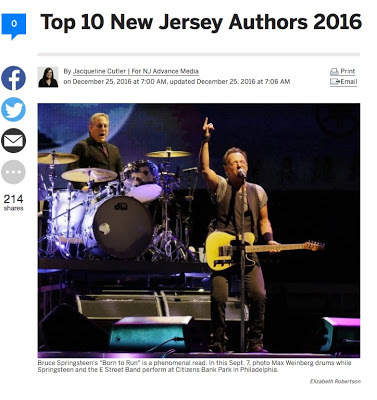 Okay. It's my blog, so I get to do this. It's a new year and I will try to behave, posting things of general interest far more than I post about myself. But friends, I must take a minute and present unto you this:
Okay. It's my blog, so I get to do this. It's a new year and I will try to behave, posting things of general interest far more than I post about myself. But friends, I must take a minute and present unto you this:My name is in a Top Ten Books list alongside the name of the Boss.
You don't believe me? I hardly believe myself. But here is This Is the Story of You so generously included in a top NJ books list at NJ.Com. I've got a link and everything .
Thank you, New Jersey. Thank you. And thank you, Lara Starr of Chronicle for letting me know.




Published on January 03, 2017 13:52



